- 2022 was a memorable year most investors want to forget
- 2023 will not be easy either
- InvestingPro+ highlights the healthiest stocks in the market to avoid a repeat
The 2022 market will go down in the history books, but for very different reasons than recent years. The bear market, the popping of the tech and crypto bubbles, and the losses new investors suffered won’t be easily forgotten. And the sell-off after the last Fed meeting of the year was just the icing on that hard-to-swallow cake.
Any 2023 outlook includes a landscape of inflation still lurking, interest rates at 15-year highs in response, and recession as a potential outcome. At the same time, if the 2020s have taught us anything so far, it’s that you have to be prepared for any outcome. The economic cycle in the COVID era has been hard to anticipate, and that won’t change.
For this article, I leaned on InvestingPro+, and specifically its financial health score calculations and the screener tool. The financial health score is a transparent calculation of a company’s position based on its profitability, relative value, growth, price momentum, and cash flow health. The rankings are all relative to peers and the market as a whole, so it gives us an easy way to see the best positioned companies in the market.
I’m going to share three stocks that have the financial health to survive and thrive in any market environment, as well as one stock that is an example of what to avoid.
Health score screenshots and financial metrics taken on December 22nd before market open.
Healthy Stocks
Nucor
Nucor Corp (NYSE:NUE) is InvestingPro+’s healthiest S&P 500 stock. Quadrupling free cash flow in 2021, and then growing that 150% in the first 9 months of 2022, will lead to financial health. Nucor has used that boon to acquire a business and refinance some of its debt, managing to lower its interest rate. It has also bought back nearly 5% of shares so far this year.
Nucor is a steel company and thus a commodity play, and the commodity sector can shift quickly. A recession would weigh on steel demand, which could explain why the company is trading at 4.5x trailing free cash flow, despite these sterling numbers. It is dangerous to buy a cyclical company when it is trading cheaply, as that cheapness often reflects that the cycle could deteriorate. What is reassuring about Nucor’s financial health, at least, is that the company is hardly overextended. Instead, it has strengthened its structure and business prospects, which may make it more appealing over the long haul.
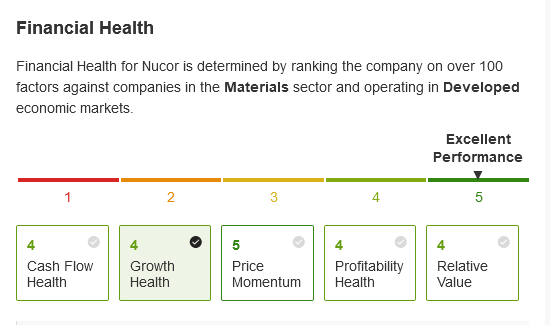
Source: InvestingPro+
Abbott Laboratories
Abbott Laboratories (NYSE:ABT) is a steadier option than Nucor. The healthcare company has slowly but surely grown its revenue, operating income, and net income over the last five years:
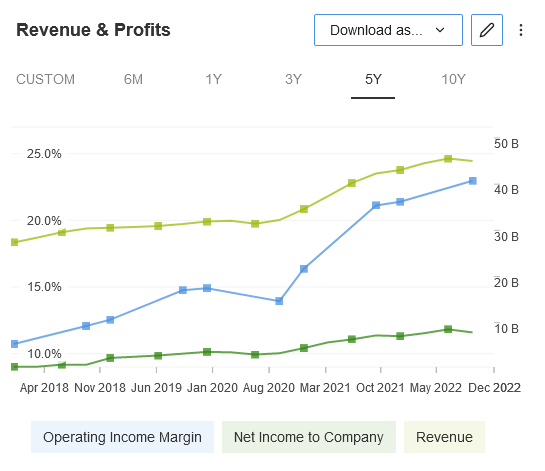
Abbott is not exactly a bargain - 23.5x free cash flow, 24.2x trailing PE, and 20.2x forward PE. And the company did sell off in line with the market this year. But Abbott is much less likely to hit a major problem than most companies, has solid growth for a company its size, and the profits to match. It recently hiked its dividend as well. That means Abbott may not be a high flier, but it is likely to provide a portfolio more surety than your average S&P 500 stock.
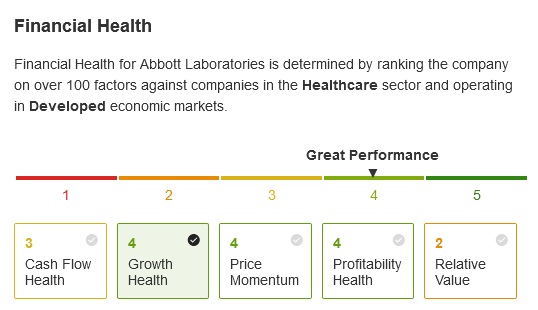
Source: InvestingPro+
Qualcomm Industries
Qualcomm Incorporated (NASDAQ:QCOM), one of the poster children of the dot-com collapse, has had another rough bear market. Shares are down more than 35%, trailing the Nasdaq. There are concerns about the company’s smartphone reliance.
So what does InvestingPro+ see in the stock? We can start with an impressive recent earnings growth record, as EPS has shot up 46% per year the past three years. There is also a strong net income number compared to peers, and high returns on equity. The company’s returns over the last 4 and 5 years also speak well of it, even given the yearlong bear market.
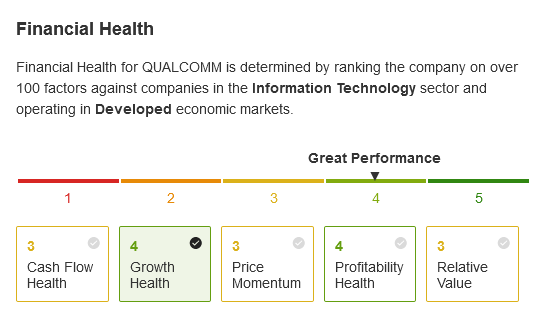
Source: InvestingPro+
Stock To Avoid: Carnival Cruises
We can keep it simple. The cruise business had full cycle profitability challenges even before COVID; COVID greatly impaired the sector, forcing the key players to raise capital; and the economic climate has not been favorable to a quick recovery.
Put that all together and Carnival Corporation (NYSE:CCL) had its best post-pandemic quarter this summer, and shares still plummeted. While they climbed a little in response to December’s Q4 earnings, the company burned over $6 billion in net losses and free cash flow losses in its fiscal 2022. It has had to raise at least $3.3B in debt or stock, and that before recent reports of more debt raising. That leaves the company with poor cash flow health, poor profitability health, and poor growth health.
It could be that Carnival sails through this Bermuda triangle of challenges, but with all the dilution and debt it’s had to rely on to make it there, the destination looks less promising for investors. The same holds for Royal Caribbean (NYSE:RCL) or Norwegian Cruise Line Holdings (NYSE:NCLH), both of which are tagged as “Weak Performance” by InvestingPro+’s health score as well.
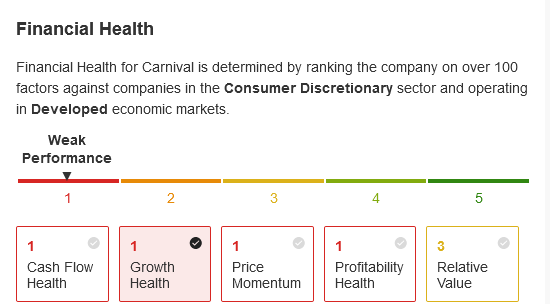
Source: InvestingPro+
Your Portfolio’s New Year Health Check
The market changes fast, and it’s important to balance a perspective on the future with humility about the future being hard to predict. One way to do this is to ground oneself in the data and in what has happened in recent years or past cycles, and not just the past 12-24 months, as a sign of what could happen going forward.
InvestingPro+ allows us to do that in a non-emotional, fundamental-driven way. This article presents three stocks you may want to do more research on for 2023, based on their strong financial health, and one stock to avoid based on its unhealthy situation. That’s based on only the numbers side of the story, and there’s more to learn about each stock.
In a market where the story can change from one day to the next, starting with the numbers may be the healthiest decision.
Disclaimer: I have no positions in any stocks mentioned, though I may consider opening a position in Nucor in the coming weeks.

